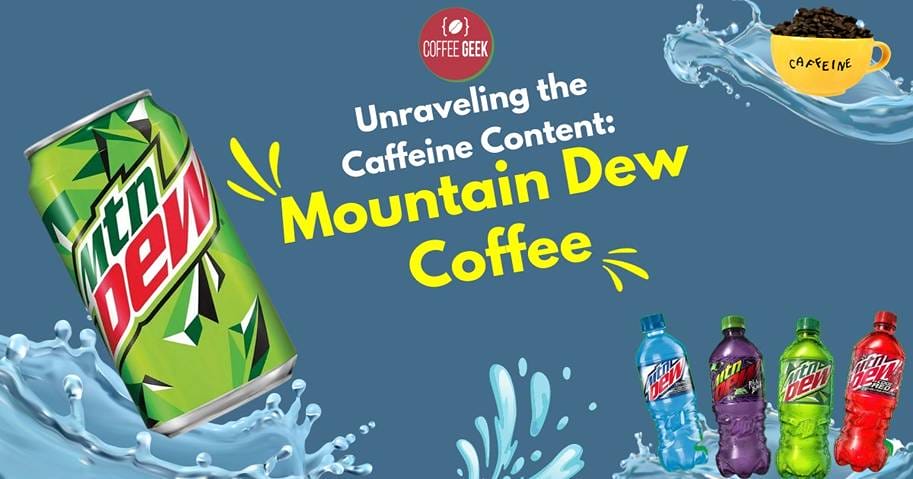In the bid to stay recharged and focused, we often reach out for our favorite caffeine-packed drinks such as Mountain Dew or coffee.
You have probably pondered how much caffeine is in Mountain Dew Coffee vs a cup of coffee.
It’s a common inquiry given our daily caffeine needs and desire for that perfect jolt of energy.
Addressing this question and many more, we delve into the realm of these caffeinated beverages and the stimulant they share.
- How much Caffeine is in Mountain Dew Vs a Cup of Coffee?
- Is Mountain Dew a Good Source of Caffeine as compared to Coffee?
- Coffee Latte or Soda: Which has more caffeine?
- Comparing the Sugar and Caffeine Content: Mountain Dew Vs Coffee
- How Does the Brewing Method Affect the Caffeine Content?
- People Also Ask
How much Caffeine is in Mountain Dew Vs a Cup of Coffee?
Understanding the Caffeine Content in Mountain Dew
Originally manufactured by PepsiCo, Mountain Dew contains a fair amount of caffeine. To be precise, it’s about 54 mg per 12 fl oz, one of the highest among soft beverages.
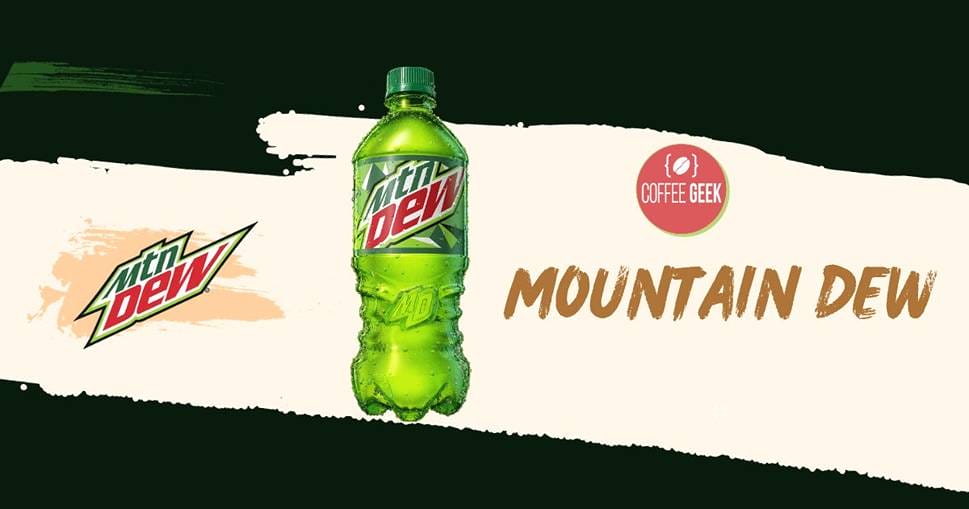
This popular energy drink has earned its fans for the distinctive carbonated kick and the ability to fuel the day.
Comparing the Caffeine Content: Mountain Dew vs Coffee
A cup of black coffee, brewed in a typical coffee shop, generally contains about 150 mg of caffeine, significantly more than a soda like Mountain Dew.
Nevertheless, factors such as the type of coffee or tea and the brew method can impact this amount of caffeine, making the comparison slightly more complicated.
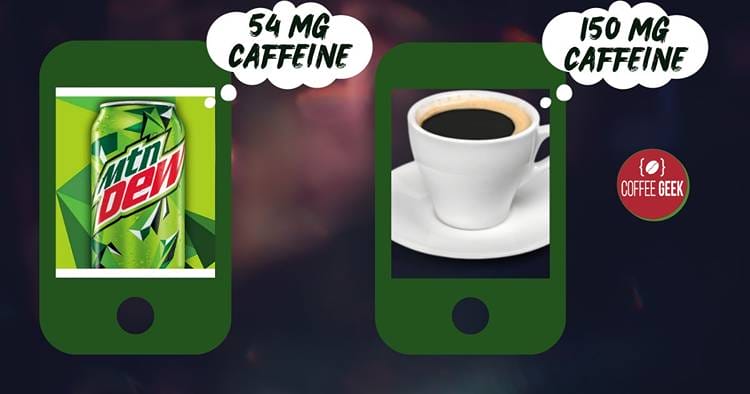
Does Serving Size Impact Caffeine Concentration?
Indeed, serving size can influence the caffeine concentration in your drink. For instance, a small Mountain Dew will contain less caffeine compared to its larger counterparts.
Similarly, a coffee latte from a coffee shop typically has more caffeine than a home-brewed cup due to differences in serving amount and how they serve coffee.
Is Mountain Dew a Good Source of Caffeine as compared to Coffee?
The Role of Mountain Dew as an Energy Drink
The fact that Mountain Dew is one of the soft drinks with the highest levels of caffeine positions it as a viable energy drink.
Additionally, ingredients like concentrated orange juice and preservatives for freshness can contribute to the energy boost it promises.
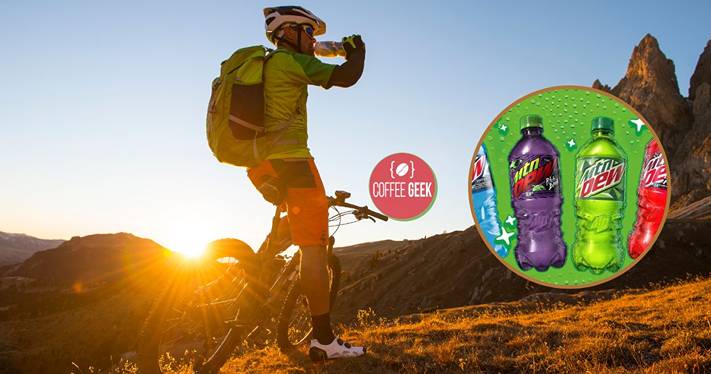
Coffee as a Traditional Source of Caffeine
Coffee remains a traditional caffeine source with millions of people starting their day fueled by coffee.
Although coffee usually contains more caffeine than mountain dew, its impact can differ based on personal caffeine tolerance levels.
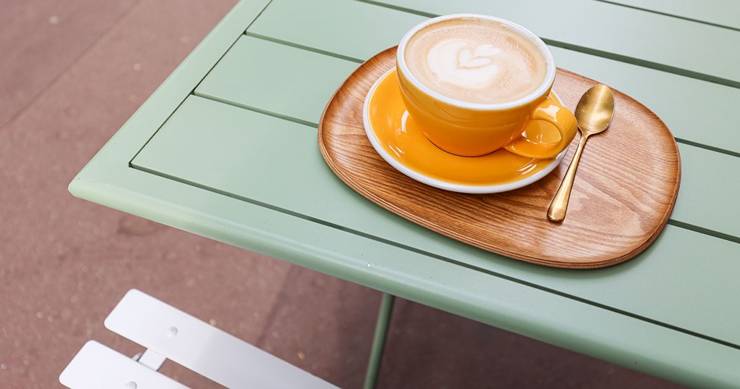
Deciding the Better Source of Caffeine: Personal Preferences and Health Impact
The better caffeine source – Mountain Dew or coffee – boils down to personal preferences and health considerations.
Mountain Dew can provide a quick energy jolt, but coffee can offer a range of flavors and ratios.
The impact of both on health also largely depends on one’s daily caffeine limit and response to sugar content.
Coffee Latte or Soda: Which has more caffeine?
Unique Caffeine Profile of a Coffee Latte
The caffeine content of coffee lattes varies based on the coffee or tea used and the brewing techniques.
For instance, strong black coffee brewed for a latte may contain significantly higher caffeine levels compared to standard coffee shop lattes.
Unpacking the Caffeine Content in a Soda like Mountain Dew
Mountain Dew Energy is known for its caffeine content.
When compared to a coffee cup, reviewers note that a 12 fl oz can of Mountain Dew has comparatively less caffeine but still promise a caffeine-fueled experience.
Latte vs Soda: A Caffeine Comparison
Comparing coffee latte with soda like Mountain Dew in terms of caffeine content reveals that the latte contains more caffeine per portion.
Mountain Dew is often consumed in higher quantities, potentially leading to higher cumulative caffeine intake.
Comparing the Sugar and Caffeine Content: Mountain Dew Vs Coffee
Breaking Down the Sugar Content: Mountain Dew Vs Coffee
While Mountain Dew provides a pleasant sugar rush along with caffeine, a cup of coffee, especially black coffee, contains typically no added sugar.
This difference may have a significant impact on the drinker’s energy levels and overall health.
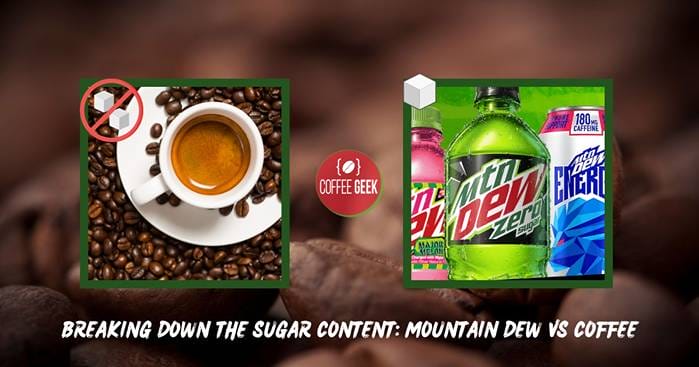
The Correlation Between Sugar and Caffeine
Sugar and caffeine often work together to provide a burst of energy.
While caffeine promotes alertness, sugar provides instant energy, and in tandem, they can potentially push your energy levels higher.
The Impact of Sugar and Caffeine on Energy Levels
The combined effect of sugar and caffeine though, while providing a quick energy spike, often leads to a crash later.
This is why beverages like Mountain Dew are usually linked with short-lived highs and coffee with more sustained alertness.
| Aspect | Information |
|---|---|
| Product Name | Mountain Dew Coffee |
| Brand | Hypothetical or Actual Brand Name |
| Description | A unique combination of Mountain Dew soda and coffee, offering a refreshing and caffeinated beverage. |
| Flavor | A blend of citrusy Mountain Dew and the rich, bold flavor of coffee. |
| Caffeine Content | Approximate milligrams of caffeine per serving. |
| Packaging | Bottles, cans, or other packaging formats. |
| Availability | Availability in select regions or nationwide. |
| Launch Date | Date when the product was introduced. |
| Marketing | Any notable marketing campaigns or promotions. |
| Serving Size | Typical serving size (e.g., 12 oz, 16 oz). |
| Ingredients | List of key ingredients. |
| Nutritional Info | Information on calories, sugar content, etc. |
| Consumer Base | Target demographic or consumer group. |
| Reviews | Average consumer ratings or reviews if available. |
How Does the Brewing Method Affect the Caffeine Content?
Brewing Coffee: Techniques and Their Effect on Caffeine Content
Different brewing methods can play a significant role in influencing the coffee’s caffeine content.
As an example, espresso, despite its smaller serving, can often pack in more caffeine than a regular cup of coffee because of its technique.
Manufacturing Soda: How is Mountain Dew Made?
The making of Mountain Dew involves a mix of carbonated water, sugar, and caffeine along with other ingredients like food coloring, preservatives, and citric acid.
This consistent manufacturing process ensures a constant caffeine content across all cans of this PepsiCo product.
Comparing Brewed Coffee and Carbonated Soda: How it Affects the Caffeine Content
In conclusion, while brewed coffee’s content and effect can vary, soda like Mountain Dew offers a reliable mound of caffeine despite its serving amount – size.
In choosing between them, it’s important to consider not only the caffeine content but also the sugar level, your caffeine tolerance, and other personal preferences.
People Also Ask
How does the caffeine in Mountain Dew coffee compare to other beverages?
The amount of caffeine in Mountain Dew is quite high. A single 12-ounce serving contains 54 mg of caffeine, making it one of the beverages with the greatest caffeine levels among popular soft drinks.
For comparison, a serving of black tea contains around 47 mg of caffeine, and a can of Pepsi contains 37.5 mg.
On the other hand, a 12-ounce serving of coffee can contain anywhere from 95 to 200 mg of caffeine.
Thus, Mountain Dew coffee has its place in the middle of the spectrum.
What is the sugar content in Mountain Dew Coffee?
Mountain Dew is known for its high sugar content. A regular 12-ounce can of Mountain Dew contains around 46 grams of sugar. However, the sugar content in Mountain Dew coffee beverages may vary.
Who originally served the Mountain Dew coffee?
The original Mountain Dew is a carbonated soft drink introduced by Barney and Ally Hartman, two brothers, in 1940 as a mixer for alcohol.
However, the caffeinated version that we’ve come to know, labeled as ‘Mountain Dew Coffee,’ might come from PepsiCo or another drink brand.
How does the caffeine in Mountain Dew compare to Coke and Coca-Cola?
Mountain Dew contains 54 mg of caffeine per 12oz serving, which is significantly higher than both Coke and Coca-Cola.
Specifically, Coke Zero contains roughly 34 mg of caffeine in the same size serving, and the regular Coca-Cola recipe contains around 32 mg.
What’s the appeal of Mountain Dew Coffee?
Mountain Dew Coffee combines the carbonated softness and high caffeine content of classic MTN Dew with the rich flavors of coffee.
For those seeking a pick-me-up but don’t necessarily like the strong taste of coffee, it’s an excellent alternative.
Are there any other varieties of Mountain Dew?
Yes, Mountain Dew is available in a number of other variants, such as Diet Mountain Dew, Code Red, and Live Wire. Each has its distinctive flavor and caffeine content.
Is Mountain Dew coffee good for preserving freshness?
While the sugar and other additive content in Mountain Dew Coffee, like Sodium Benzoate and Calcium Disodium EDTA, can protect flavor and extend the drink’s shelf-life, it may not necessarily have a direct effect on preserving the freshness of other foods or drinks.
Do Mountain Dew and Mountain Dew Coffee contain Yellow 5 and Gum Arabic?
Yes, both Mountain Dew and Mountain Dew Coffee contain Yellow 5. They also contain Sodium Citrate and Gum Arabic, ingredients often used in soft beverages.
How many calories are there in a can of Mountain Dew Coffee?
A standard 12-ounce can of Mountain Dew has roughly 170 calories. However, the calorie count for Mountain Dew Coffee can vary based on its specific ingredient formulation, but it’s usually around 150 calories per serving.
Can I buy Mountain Dew Coffee online?
Yes, you can purchase Mountain Dew Coffee and other related products online. Many retailers carry these beverages, and you may even earn an affiliate commission if you buy through the links on our site.

